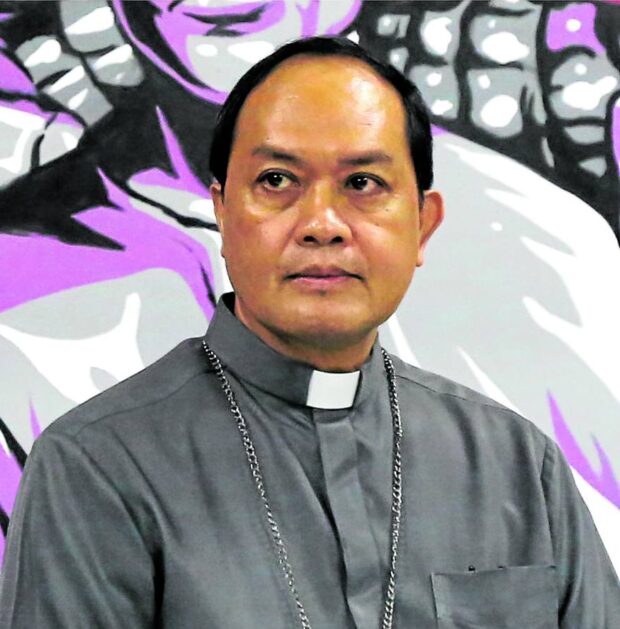
Caloocan Bishop Pablo Virgilio David
The Catholic Bishops’ Conference of the Philippines (CBCP) on Friday clarified its association with the National Task Force to End Local Communist Armed Conflict (NTF-Elcac), after its head announced earlier that the bishops now had a representative in the task force.
The CBCP also said it would take up “moral, ethical approaches” in tackling with the NTF-Elcac the decadeslong problem of insurgency.
NTF-Elcac Executive Director Ernesto Torres announced on Thursday that the CBCP would be represented in the task force by its Episcopal Commission on Public Affairs.
This is also what Caloocan Bishop Pablo Virgilio David pointed out on Friday, when he said in a statement: “It’s not exactly CBCP as a conference but the Episcopal Commission on Public Affairs that is there [in the task force] as a private sector representative.”
The commission is “engaging with … NTF-Elcac precisely to address some Church issues vis-a-vis government, including the issue about the Red-tagging of some cause-oriented groups and Church organizations by the said body,” said David, president of the CBCP.
‘Church concerns’
The bishop said further that, among the CBCP’s “31 Commissions, Committees and Offices” in its “big network,” it is the public affairs commission that “has the specific task of engaging government on many levels of dialogue over important issues.”
“The said commission also has the intention of providing moral, ethical approaches to dealing with the problem of insurgency,” said David, who also identified Bishop Reynaldo Evangelista as chair and Fr. Jerome Secillano as executive secretary of that body.
Secillano, who is also CBCP spokesperson, reiterated as well David’s clarification that it is “not the whole conference, [but] only the public affairs commission” that is represented in the task force.
He added that the Catholic Church “will not renege on our duty to advocate the upholding of human rights and the protection of human lives.”
“Membership in [NTF-]Elcac doesn’t mean being co-opted by the government. It means having the proper forum and mandate to articulate church concerns and issues affecting the people,” Secillano said.
Torres said the bishops “accepted warmly” the offer to take part in consultations and other activities with the task force. “We did not have a problem [talking] with them. In fact, they readily accepted to cooperate with us,” he said at a briefing in Malacañang, following a meeting between President Marcos and the executive committee of the task force.
Torres said “We were able to explain to them about the program of the government and our role in harmonizing the different efforts of the government and other partners, stakeholders in uplifting the condition of those living in the affected and vulnerable areas.”
“So with them on our side, it will be a lot easier to disseminate, to cascade the information, the good news of the government to those living in the far-flung areas, considering the trust and confidence and respect that the general populace have for those in the religious sector,” he added.
‘Grave concern’
Asked if the CBCP had been invited to join the task force during the administration of Rodrigo Duterte, Secillano said “For dialogues, yes. Every now and then, we engage in talks.”
But some groups warned the CBCP against joining NTF-Elcac.Human rights advocacy group Karapatan said it regarded with “grave concern” the CBCP’s inclusion as a private sector representative in the task force, adding that “NTF-Elcac’s role in persecuting church workers is no secret.”
Karapatan cited, among other instances, the charge of terrorism financing and other cases brought by the task force against the Rural Missionaries of the Philippines—and even against leaders of other religious denominations, such as Pastors Glofie Baluntong and Edwin Egar.
The Student Christian Movement of the Philippines noted the NTF-Elcac’s “habit of attacking religious leaders and community organizers.”
The CBCP itself acknowledged its recent experience with Red-tagging even just this year, as when broadcasting network Sonshine Media Network International described San Carlos, Negros Occidental Bishop Gerardo Alminaza as a “mouthpiece” of the Communist Party of the Philippines.”
But David expressed optimism that the CBCP can come up with “concrete resolutions” with the task force.

